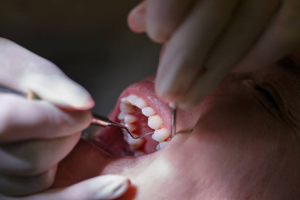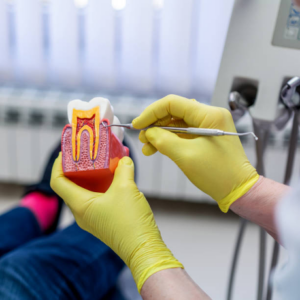
Periodontal scaling and root planing are essential for maintaining good oral health. It involves the removal of plaque and tartar buildup from beneath the gum line and smoothing the root surface to help prevent further buildup and infection.
Performed by a dentist or hygienist, periodontal scaling and root planing can help reduce any discomfort caused by gingivitis or periodontitis. It can also help reduce the risk of tooth loss and the need for more invasive treatments.
Whether you’re looking to prevent gum disease or treat an existing condition, understanding the basics of periodontal scaling and root planing is essential.

Periodontal scaling and root planing is a dental procedure performed by a dentist or hygienist to help remove plaque and tartar buildup. It is a comprehensive treatment that not only restores teeth to health but also helps prevent future problems.
During the procedure, the dentist or hygienist will use either a scaler or a rotary instrument to gently remove plaque and tartar buildup from beneath the gum line.
Root surface improvement is another common element in the procedure, which can improve overall gum health by reducing the risk of reattachment.
A dental scaling and root planing procedure can last between 30 minutes and two hours, depending on the severity of the buildup, how often dental scaling has been performed in the past, and the number of teeth involved.
The hygienist or dentist performing the procedure will apply a local anesthetic to your gums before proceeding. This will make the procedure less painful and help you relax. If a rotary is used, you will feel a vibration sensor that is similar to the feeling of a gentle massage.
You may also receive a few shots of topical anesthetic in some numb regions of your mouth, such as the palate or the roof. If a scaler is used, it will feel like you have a rough piece of sandpaper against your teeth.
There may be some slight discomfort, but it should not be unbearable. The dentist or hygienist will also check your teeth for cavities or other issues during the procedure.
There are several benefits associated with periodontal scaling and root planning. Not only does it reduce the risk of tooth loss, but it can also help prevent other dental issues, such as the reattachment of gums to teeth, which can lead to the loss of teeth.
It can also reduce the risk of gum disease, including gingivitis and periodontitis, and help improve overall oral health.
Before you head to the dentist or hygienist to have your teeth professionally cleaned, you can do a few things to make the process easier.
This will ensure enough time for the anesthesia to take effect before the procedure begins.
Consider bringing a friend or family member along for comfort as well.
This will keep the procedure as safe as possible and help avoid complications.
Make sure you are up to date with your dental exams!
After the procedure, you can expect some swelling and mild pain. It is important not to brush or floss your teeth during the first 24 hours after the procedure, as it can lead to unnecessary bleeding or irritation.
It is also recommended that you avoid eating foods that are difficult to chew, like steak or popcorn. You can also use an over-the-counter pain medication to reduce the severity of any discomfort.
If applicable, you should also consider taking an anti-inflammatory medication to help reduce swelling. Following all aftercare instructions provided by your dentist or hygienist after the procedure is essential.
This will help reduce any swelling and speed up the healing process. Remember that you may experience a more intense sensitivity for a few days after the procedure, so it is best to ease back into your routine as soon as you feel comfortable.
Many treatments are available for gum disease, including laser treatments, but they are more comprehensive than periodontal scaling and root planing.
Laser treatments, for example, are a one-off procedure that can be completed in a single visit.
Scaling and root planing, however, is a thorough process that requires multiple visits. It is also more effective at combating gum disease and improving oral health in general.
Periodontal scaling and root planing are essential for maintaining good oral health. This procedure helps prevent further buildup and infection.
It can also help reduce the risk of tooth loss and the need for more invasive treatments. Whether you are looking to prevent gum disease or treat an existing condition, understanding the basics of periodontal scaling and root planing is essential.
Quality and sophistication should not imply less relatability and personalization. At Tabor Dental Associates, we've built a clinic that gives patients the comprehensive, state-of-the-art care they want and deserve, along with the reliable small-town values they expect.
What may be surprising is that we accomplish all of this in a pleasant and relaxed setting. The fact that we offer high-quality dental care and have signed guitars in each patient room shows how much we care.
We have become one of the most esteemed and well-regarded dentists in Hendersonville, Tennessee, and the greater Nashville region by basing our business on professionalism, enthusiasm, expertise, and commitment. Make an appointment now to see how we combine art, science, and trust with every patient.